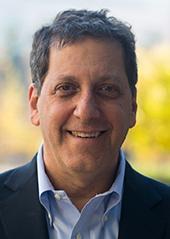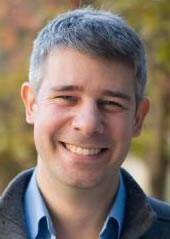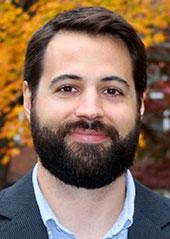By Nicholas Weiler and Nicholas Roznovsky
The work of a multi-institution research team led in part by UC San Francisco Department of Psychiatry scientists has been recognized by Neuron with inclusion on the journal's “Best of 2016-2017” list.
Their paper, "De Novo Coding Variants Are Strongly Associated With Tourette Disorder," was cited as one of the five most accessed research papers during the final quarter of 2016 and first three quarters of 2017. Written by a group of top researchers from UCSF, Rutgers University, Massachusetts General Hospital, the University of Florida, and Yale School of Medicine, the article included contributions from department members Jeremy Willsey, PhD (co-lead author); Stephan Sanders, PhD; Jeffrey Mandell; Louw Smith, MSc; Shan Dong, PhD; and Matthew W. State, MD, PhD (co-senior author).
Neuron, which is published biweekly, is one of the most influential and relied upon journals in the field of neuroscience. The journal regularly highlights biophysical, cellular, developmental, and molecular approaches with a systems approach to sensory, motor, and higher-order cognitive functions, and serves as one of the premier intellectual forums of the entire neuroscience community.
The study was originally pushed online by Neuron on May 3, 2017. It identified the first “high-confidence” risk gene for Tourette disorder as well as three other probable risk genes. These findings were a step forward in understanding the biology of the disorder, the authors said, which will aid in the search for better treatments.
“In the clinic, I have seen again and again the frustration that patients and families experience because of our lack of understanding and the limitations of our current treatments," commented State, the Oberndorf Family Distinguished Professor and chair of the Department of Psychiatry at UCSF, when the study was initially published. "But we have now taken a major initial step forward in changing this reality, thanks to new genomic technologies and a very successful long term collaboration between clinicians and geneticists.”
Studying rare variants to illuminate disease biology
For the new paper, the researchers used an approach that State and colleagues have pioneered in studies of the genetic basis of autism spectrum disorders, and which has led to important discoveries in that field over the past five years.
As in this earlier research, the scientists involved in the Neuron study compared the protein-coding regions of the genomes of children with Tourette disorder to the genomes of their parents to identify so-called de novo variants — rare genetic mutations that are not inherited from parents, but rather occur spontaneously at conception. De novo variants often have stronger biological effects than inherited variants passed from generation to generation, explained Willsey, an assistant professor of psychiatry and member of the UCSF Institute for Neurodegenerative Diseases.
“We study de novo variants even though they are rare because they generally have more extreme effects than inherited mutations and can provide us much information about the underlying causes of a disease,” Willsey said. “This also translates to developing therapies: if these variants greatly increase a child’s risk of Tourette disorder, we would expect that understanding these changes could potentially lead to very effective treatments for the disorder.”
The team analyzed genomic data from 311 “trios” — children with Tourette disorder and their parents, most of whom were unaffected by the disorder — collected by the Tourette International Collaborative Genetics group (TIC Genetics), and found strong evidence that de novovariants can play a significant role in triggering the disorder. To be certain of what they were seeing, the team conducted a replication study in 173 trios from the Tourette Association of America International Consortium for Genetics (TAAICG), and found the same results.
Extrapolating from the number of de novo variants they observed in these relatively small datasets, the researchers were able to estimate that approximately 12 percent of Tourette disorder cases are likely to involve de novo variants, and that these variants probably strike about 400 different key risk genes.
For more information about this groundbreaking study, read our article from May 2017.
About UCSF Psychiatry
The UCSF Department of Psychiatry and the Langley Porter Psychiatric Institute are among the nation's foremost resources in the fields of child, adolescent, adult, and geriatric mental health. Together they constitute one of the largest departments in the UCSF School of Medicine and the UCSF Weill Institute for Neurosciences, with a mission focused on research (basic, translational, clinical), teaching, patient care and public service.
UCSF Psychiatry conducts its clinical, educational and research efforts at a variety of locations in Northern California, including UCSF campuses at Parnassus Heights, Mission Bay and Laurel Heights, UCSF Medical Center, UCSF Benioff Children's Hospitals, Zuckerberg San Francisco General Hospital and Trauma Center, the San Francisco VA Health Care System and UCSF Fresno.
About the UCSF Weill Institute for Neurosciences
The UCSF Weill Institute for Neurosciences, established by the extraordinary generosity of Joan and Sanford I. "Sandy" Weill, brings together world-class researchers with top-ranked physicians to solve some of the most complex challenges in the human brain.
The UCSF Weill Institute leverages UCSF’s unrivaled bench-to-bedside excellence in the neurosciences. It unites three UCSF departments—Neurology, Psychiatry, and Neurological Surgery—that are highly esteemed for both patient care and research, as well as the Neuroscience Graduate Program, a cross-disciplinary alliance of nearly 100 UCSF faculty members from 15 basic-science departments, as well as the UCSF Institute for Neurodegenerative Diseases, a multidisciplinary research center focused on finding effective treatments for Alzheimer’s disease, frontotemporal dementia, Parkinson’s disease, and other neurodegenerative disorders.
About UCSF
UC San Francisco (UCSF) is a leading university dedicated to promoting health worldwide through advanced biomedical research, graduate-level education in the life sciences and health professions, and excellence in patient care. It includes top-ranked graduate schools of dentistry, medicine, nursing and pharmacy; a graduate division with nationally renowned programs in basic, biomedical, translational and population sciences; and a preeminent biomedical research enterprise. It also includes UCSF Health, which comprises top-ranked hospitals – UCSF Medical Center and UCSF Benioff Children’s Hospitals in San Francisco and Oakland – and other partner and affiliated hospitals and healthcare providers throughout the Bay Area.








